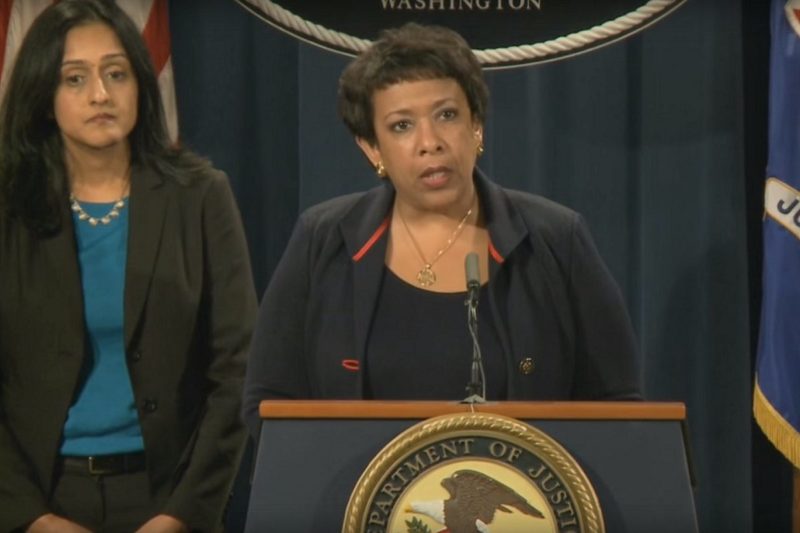Justice Department Sues City of Ferguson Over Unconstitutional Policing
Wednesday’s civil rights lawsuit, filed in the District Court of Eastern Missouri, comes a year and a half after Ferguson police officer Darren Wilson shot and killed an 18-year-old unarmed Black teenager, Michael Brown.

The United States Department of Justice announced Wednesday it was suing the City of Ferguson, Missouri, after the city council voted down a draft agreement aimed at curbing racially biased and unconstitutional policing and municipal court practices in the St. Louis suburb.
Wednesday’s civil rights lawsuit, filed in the District Court for the Eastern District of Missouri, comes a year and a half after Ferguson police officer Darren Wilson shot and killed an 18-year-old unarmed Black teenager, Michael Brown.
Brown’s death and the months of unrest and protest that followed, as well as sustained pressure from racial justice advocates, prompted the justice department to initiate a thorough investigation into Ferguson’s courts and policing policies, which residents have charged discriminate against Black residents, who comprise 67 percent of the city’s population of some 21,000.
The report was published last March, and spurred a months-long, closed-door negotiation between Ferguson city officials and the justice department in an attempt to reach an agreement on how best to reform the city’s codes and conduct.
That tentative agreement, called a consent decree, was made public in late January after seven months of talks, and, if finalized, would have allowed for an out-of-court solution. However, in a 6-0 vote on Tuesday night, the Ferguson City Council made its acceptance of the proposal conditional upon several amendments, including some that would limit the city’s estimated costs of enacting reforms.
In a statement released Wednesday, the head of the justice department’s Civil Rights Division, Vanita Gupta, said the council’s attempts to “unilaterally amend the negotiated agreement … creates an unnecessary delay in the essential work to bring constitutional policing to the city.” Shortly thereafter, the lawsuit was filed.
According to the complaint, Ferguson’s police department, municipal courts, and office of the city’s prosecuting attorney routinely engage in practices that deprive residents of their constitutional rights, including stops, searches, arrests, and use of force that violate the Fourth Amendment; a clampdown on freedom of expression in violation of the First Amendment; and discrimination “against African Americans in violation of the Fourteenth Amendment.”
The suit further alleges that it is “unlikely that the City will remedy these patterns and practices of unlawful conduct absent judicial mandate and oversight,” thereby necessitating a court order to “secure the declaratory and injunctive relief needed to ensure compliance with the Constitution and federal law.”
Much of the basis for the lawsuit lies in the department’s initial investigation, which revealed the deliberate targeting of African Americans by various arms of Ferguson’s municipal machine. For instance, the report found, nearly 90 percent of documented use-of-force cases by the Ferguson Police Department were against African Americans, while data covering the 2012-2014 period shows that Black people accounted for 85 percent of vehicle stops, 90 percent of citations, and 93 percent of arrests made by Ferguson police.
The justice department discovered that the municipality’s reliance on fines for revenue generation has “fundamentally compromised” the municipal court’s ability to serve as a neutral arbiter of the law, and has turned residents into a piggy bank for the city. These practices, the report found, “impose unnecessary harm, overwhelmingly on African American individuals.” One Black woman, whose case dates back to 2007, has twice been arrested, spent six days in jail, been charged with seven “failure to appear” offenses, and paid out hundreds of dollars in fines—all because of a single parking ticket.
In the draft consent decree, the justice department proposed such remedies as an overhaul of the police department’s use-of-force policies, removal of the “quota” system of citations and arrests, and a clampdown on “stop-and-frisk” activity, including stringent recording of police officers’ compliance with residents’ constitutional right to consent to or deny body searches.
According to news reports, an analysis of the projected costs of implementing these reforms turned up an estimated bill of $3.7 million in the first year alone, and an additional $3 million for each of the next two years—figures that Ferguson officials and some residents feared would bankrupt the city, which operates on a $14 million annual budget.
But federal officials reject this argument.
“There is no price for constitutional policing,” Attorney General Loretta Lynch said Wednesday. “The citizens and residents of Ferguson deserve what every American is guaranteed under the constitution—the right to be free from excessive force … from unconstitutional arrests, and from a fine system that was literally breaking their backs.”
“Ferguson now has two options,” Jeffrey Mittman, executive director of the Missouri chapter of the American Civil Liberties Union, said in an interview with Democracy Now! on Thursday. “They can engage in full-scale warfare and try to fight these allegations, which we all know are very well founded. [If they do], they will most likely lose in federal court and they’ll then be [faced] with attorney fees for fighting a losing battle plus the expense of implementing the resulting requirements.”
“Alternatively,” he said, “they can take a long hard look at their prior practices and the negotiated agreement and decide to do the right thing.”

